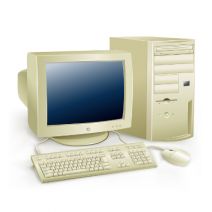SMART Blog
Why Should You Upgrade Your Old PC When it’s Doing Everything You Need it To?
 Technology changes at an astounding rate. Because of constant technological improvements, some users feel the need to replace their devices the second a bigger and better technology is launched. On the other hand, the increase in reliability of computers in recent years has has hindered the sales of new PCs.
Technology changes at an astounding rate. Because of constant technological improvements, some users feel the need to replace their devices the second a bigger and better technology is launched. On the other hand, the increase in reliability of computers in recent years has has hindered the sales of new PCs.
According to a study from Intel, over a billion PCs in the world are three years old or older, with around half of those four or five years old. That’s over a billion PCs that are using technology that will be obsolete in a year or two. Or maybe not; therein lies the current issue with the PC industry. Technology continues to move forward with increased reliability. As a result, people are less likely to buy new hardware if their current machines work perfectly fine.
The problem many PC manufacturers face is that the pace of technological growth has slowed down some. Therefore, PCs from three years ago are still capable of being used with today’s software. More importantly, though, is that hardware is growing more reliable, meaning that there’s less of a chance that you’ll encounter troubles before your technology’s time is up. As reported by ZDNet:
Sure, on paper it's going to be advertised as being faster, and benchmark tests will support this, but in the real world - assuming that the old one isn't all kludged up and ailing - you're just not going to see much difference. Sure, there might be a slightly faster boot up time, or it might be a little snappier, but most of the gains that new PC owners see are nothing more than confirmation bias. Sure, if you go to the performance end of the scale then things are different, but your average home or office PC spends most of its time running a web browser or a word processor application. A three-year-old PC can do that without breaking a sweat.
In other words, if they are not careful, people end up replacing one PC with a machine that can largely perform the exact same functions. When this happens, people find that it’s often not worth the extra investment to upgrade to more recent technology, considering their old tech works just as well and doesn’t have a hefty price tag on it. There is some logic there. You don’t want to spend money on new solutions haphazardly; it could break your business’s budget, More importantly, if you still use certain legacy applications, your organization could hit a brick wall when upgrading to more recent operating systems or hardware.Of course, sometimes your industry will move beyond the point where it will support older versions of software applications, so an upgrade is unavoidable.
One more thing to think about: if you are experiencing slow computer issues or sluggish performance, it might just be a single component of your workstation that needs to be addressed. Certain hardware components, like hard drives and RAM, attribute the most to PC performance, and these upgrades are much easier on the budget than replacing the entire workstation. Beyond hardware, it’s also possible the slowness can be caused by a software issue, or simply a need for routine maintenance. Before shelling out for any expensive hardware or software solutions, be sure to consult a trusted technician.
Keep in mind, however, that regularly exploring all that the latest technology can do for you business is a good thing. If your office’s technology is top of the line and utilized properly, you’ll increase your productivity and have an invaluable advantage over the competition.




Comments